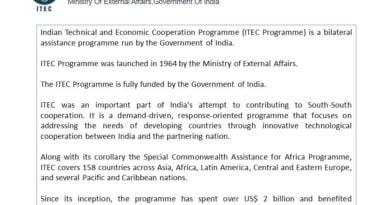Conjugal Rights
Context:
A petition challenging the provision allowing restitution (recovery) of conjugal rights under Hindu personal laws (Hindu Marriage act 1955).has been pending in the Supreme Court (SC) for months without a hearing.
What are conjugal rights?
- Conjugal rights are rights created by marriage, i.e. the right of the husband or the wife to the society of the other spouse.
- The law recognizes these rights— both in personal laws dealing with marriage, divorce etc and in criminal law requiring payment of maintenance and alimony to a spouse.
- Section 9 of the Hindu Marriage Act 1955 and Section 22 of the Special Marriage Act 1954 empower a husband or a wife to move the local district court, complaining that the other partner has “withdrawn” from the marriage without a “reasonable cause”.
- Similar provisions exist in Muslim personal law as well as the Divorce Act, 1869, which governs Christian family law.
- The concept of restitution of conjugal rights is codified in Hindu personal law now, but has colonial origins and has genesis in ecclesiastical law.
- Similar provisions exist in Muslim personal law as well as the Divorce Act, 1869, which governs Christian family law.
- Incidentally, in 1970, the United Kingdom repealed the law on restitution of conjugal rights.
How can a case under Section 9 be filed?
- If a spouse refuses cohabitation, the other spouse can move the family court seeking a decree for cohabitation.
- By petition to the District Court, the aggrieved party may apply for the restitution of conjugal rights.
- It provides an opportunity to an aggrieved party to apply for maintenance under Section 25 of the Hindu Marriage Act, 1955.
- If the order of the court is not complied with, the court can attach property.
- However, the decision can be appealed before a High Court and the Supreme Court.
- Normally, when a spouse files for divorce unilaterally, the other spouse files for restitution of conjugal rights if he or she is not in agreement with the divorce.
- The provision is seen to be an intervention through legislation to strike a conciliatory note between sparring spouses.
Question over gender-neutrality
- Although the law is ex-facie (‘on the face if it’) gender-neutral since it allows both wife and husband to seek restitution of conjugal rights, the provision disproportionately affects women.
- Women are often called back to marital homes under the provision and given that marital rape is not a crime, leaves them susceptible to such coerced cohabitation.
- It will also be argued whether the state can have such a compelling interest in protecting the institution of marriage that it allows legislation to enforce the cohabitation of spouses.
Some Gender-related Laws in Colonial India
- Bengal Sati Regulation Act, 1829 made the practice of Sati illegal in all of British India.
- Hindu Widow’s Remarriage Act, 1856 legalised the remarriage of Hindu widows in all the regions which came under the jurisdiction of the East India Company.
- Female Infanticide Prevention Act, 1870 was a legislative act passed in British India, to prevent murder of female infants.
- Age of Consent Act, 1891 was a legislation enacted in British India on 19 March 1891 which raised the age of consent for sexual intercourse for all girls, married or unmarried, from ten to twelve years in all jurisdictions, its violation subject to criminal prosecution as rape.
- Child Marriage Restraint Act, 1929 fixed the marriageable age for girls at 14 years and 18 years for boys. It is popularly known as the Sharda Act after its sponsor, Harbilas Sarda.
Reason for Challenging the Law:
- Violation of Rights:
- The law is being challenged now on the main grounds that it violates the fundamental right to privacy.
- In 2019, a nine-judge Bench of the SC recognised the right to privacy as a fundamental right.
- The right to privacy is protected as an intrinsic part of the right to life and personal liberty under Article 21 and as a part of the freedoms guaranteed by Part III of the Constitution.
- The 2019 judgement has set the stage for potential challenges to several laws such as criminalisation of homosexuality, marital rape, restitution of conjugal rights, the two-finger test in rape investigations.
- The plea argues that a court-mandated restitution of conjugal rights amounted to a “coercive act” on the part of the state, which violates one’s sexual and decisional autonomy, and right to privacy and dignity.
- Biassed Against Women:
- Although the law is gender-neutral since it allows both wife and husband to seek restitution of conjugal rights, the provision disproportionately affects women.
- Women are often called back to marital homes under the provision, and given that marital rape is not a crime, leaves them susceptible to such coerced cohabitation.
- It is also argued whether the state can have such a compelling interest in protecting the institution of marriage that it allows a legislation to enforce cohabitation of spouses.
- Not in Consonance with SC Judgements:
- In the recent judgement of Joseph Shine v Union of India 2019, the SC has put great emphasis on the right to privacy and bodily autonomy of married women, stating that marriage does not take away their sexual freedom nor choice.
- If everybody is entitled to their bodily autonomy, choice, and right to privacy, how can a court mandate two adults to cohabit if one of them does not wish to do so.
- Misuse of the Provision:
- Another pertinent matter to take into consideration is the misuse of this provision as a shield against divorce proceedings and alimony payments.
- Often an aggrieved spouse files for divorce from their place of residence and their spouse retaliates by filing for a decree of restitution in their place of residence.
Previous Judgements:
- In the 1960s, the Punjab and Haryana High Court in the Tirath Kaur case, upheld restitution of conjugal rights, noting that “a wife’s first duty to her husband is to submit herself obediently to his authority and to remain under his roof and protection”.
- The courts, in a series of judgments in the 1980s, have supported the law, holding that the denial of marital and sexual life to the husband by the wife by refusing to permanently return to him is an act of both mental and physical cruelty.
- In 1984, the SC had upheld Section 9 of the Hindu Marriage Act in the case of Saroj Rani v Sudarshan Kumar Chadha, holding that the provision serves a social purpose as an aid to the prevention of break-up of marriage.
- In 1983, a single-judge bench of the Andhra Pradesh High Court had for the first time struck down the provision in the case of T Sareetha v T Venkatasubbaiah and declared it null and void.
- It cited the right to privacy among other reasons. The court also held that in “a matter so intimately concerned the wife or the husband the parties are better left alone without state interference”.
- The court had, most importantly, also recognised that compelling “sexual cohabitation” would be of “grave consequences for women”.
- However, in the same year, a single-judge Bench of the Delhi High Court took a diametrically opposite view of the law. In the case of Harvinder Kaur v Harmander Singh Chaudhry, the Delhi High Court upheld the provision.
- The Madhya Pradesh High Court in the Vibha Shrivastava case, noted:
- This orthodox concept of wife ( Dharmpatni, Ardhangini, Bharya or Anugamini) and expectations from her to subject herself to husband’s wishes has undergone a revolutionary change with education and high literacy in women and with recognition of equal rights to women in the constitution and abolition of sex distinction in all walks of life.
- She is a partner in marriage with equal status and equal rights with the husband, and the marriage cannot be a tyranny.
Way Forward
- The debate over criminalising marital rape compels a relook at how the provisions of restitution of conjugal rights, though gender-neutral, place an additional burden on women and poses a direct threat to their bodily autonomy, privacy and individual dignity.
- While we talk about gender equality and the gender-neutral quality of the law, women are still at a disadvantage in Indian society and this provision capitalises on it.
- Dowry deaths are a plague on society and women being emotionally and mentally manipulated and tortured for dowry are aplenty.
- It’s time for the Indian judiciary and society to shift to more progressive views starting with the progressive theory of marriage. Marriage is not built upon the ceremonies but upon the autonomy and freedom of two individuals who agree to share them with each other.
Source: The Hindu
You can find many articles on ACTS AND AMENDMENTS (part of GS II) in our website. Go through these articles share with your friends and post your views in comment section.



